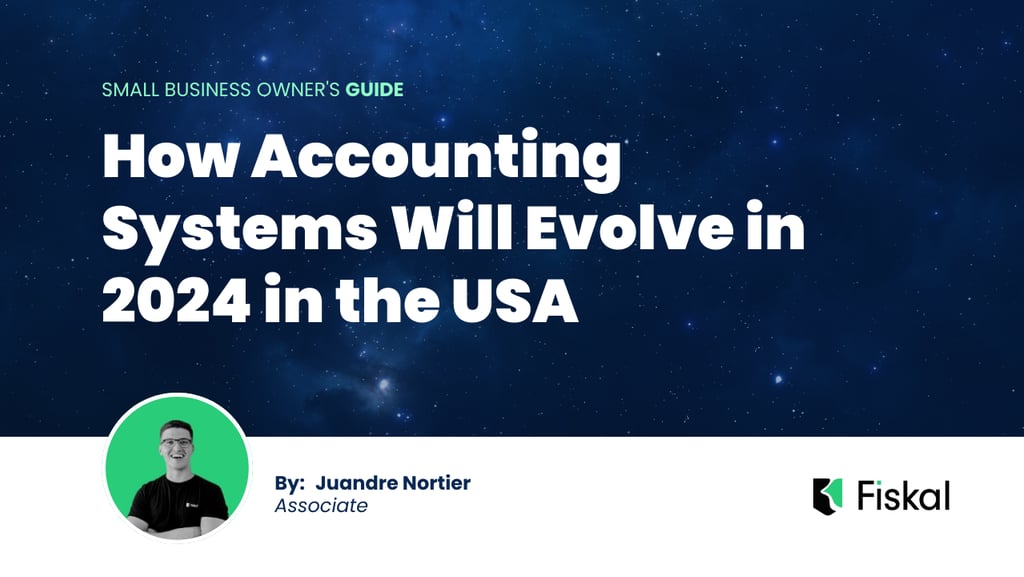Keeping Up with the Times: How Accounting Systems Will Evolve in 2024 in the USA
As technology continues to advance at a rapid pace, industries all over the world are experiencing significant transformations, and the field of accounting is no exception. In the United States, accounting systems are set to evolve drastically by the year 2024. From streamlining processes to improving accuracy and efficiency, these changes will revolutionize the way accountants approach their work. In this article, we will explore the key trends and advancements that will shape the future of accounting systems in the USA. We will delve into the role of artificial intelligence and machine learning, the increasing adoption of cloud-based software, and the growing importance of data analytics. By understanding these developments, accounting professionals will be better equipped to navigate the changing landscape and adapt their practices to stay ahead.
SYSTEMS AND SOFTWARE


Prepare to embark on a journey into the future of accounting systems in the USA. Discover how technology will shape the industry, empower accountants, and ultimately drive better financial outcomes for businesses. Don't get left behind – join us as we explore the exciting possibilities that lie ahead.
The evolution of accounting systems
Accounting systems have come a long way since the days of manual bookkeeping. With the advent of computers, spreadsheets, and accounting software, the industry has witnessed significant advancements in terms of efficiency and accuracy. However, the next wave of innovation is already on the horizon.
In the coming years, accounting systems will undergo further evolution driven by technological advancements. The integration of artificial intelligence (AI) and machine learning (ML) algorithms will revolutionize the way financial data is processed and analyzed. These technologies will automate repetitive tasks, identify patterns, and provide valuable insights, enabling accountants to focus on more strategic and value-added activities.
Cloud-based accounting software will also play a crucial role in the evolution of accounting systems. By migrating to the cloud, businesses can access their financial data anytime, anywhere, and collaborate with their accountants in real-time. This shift towards cloud-based systems will streamline processes, reduce costs, and enhance data security.
Current trends in accounting systems
Before diving into the future, it is essential to understand the current trends shaping accounting systems. These trends provide valuable insights into the direction the industry is headed and set the stage for future advancements.
One prominent trend in the accounting field is the increasing use of automation. Robotic process automation (RPA) is being adopted by many organizations to automate repetitive tasks such as data entry, invoice processing, and reconciliation. This automation not only saves time and reduces errors but also allows accountants to focus on higher-value activities like financial analysis and strategic planning.
Another trend is the growing demand for real-time financial information. With the rise of digitalization, businesses now require up-to-date financial data to make informed decisions quickly. As a result, accounting systems are evolving to provide real-time reporting capabilities, enabling businesses to monitor their financial health in real-time and take immediate action when necessary.
Technology advancements shaping the future of accounting systems
As we look towards the future, several technological advancements are set to reshape accounting systems in the USA. These advancements will not only streamline processes but also enhance accuracy and improve decision-making capabilities.
Automation and artificial intelligence in accounting systems
AI and ML technologies are poised to transform the accounting industry by automating routine tasks and providing advanced data analysis capabilities. With AI-powered algorithms, accounting systems can perform tasks such as categorizing expenses, detecting anomalies, and even generating financial statements. This automation allows accountants to shift their focus from manual data entry to strategic analysis and financial planning.
Furthermore, AI and ML can uncover valuable insights from vast amounts of financial data, enabling accountants to identify patterns, predict future trends, and make data-driven decisions. These technologies have the potential to revolutionize auditing, risk management, and fraud detection, making accounting systems more robust and efficient.
Cloud-based accounting systems
The adoption of cloud-based accounting software has been on the rise in recent years, and this trend is expected to continue in the future. Cloud-based systems offer numerous benefits, including increased accessibility, scalability, and cost-effectiveness.
By storing financial data in the cloud, businesses can access their information from anywhere, at any time. This accessibility allows for real-time collaboration between accountants and businesses, fostering efficient communication and eliminating the need for manual data transfers.
Cloud-based accounting systems also offer scalability, as businesses can easily adjust their resources based on their needs. Additionally, the cloud eliminates the need for expensive on-premises infrastructure, reducing costs and improving data security.
The role of data analytics in accounting systems
Data analytics is becoming increasingly important in the accounting field, as businesses seek to derive actionable insights from their financial data. The integration of data analytics tools within accounting systems enables accountants to analyze large datasets, identify trends, and gain a deeper understanding of their financial performance.
By leveraging data analytics, accountants can identify areas for cost reduction, optimize revenue generation, and improve overall financial outcomes. These insights can drive strategic decision-making and help businesses stay competitive in an ever-changing market.
Regulatory changes impacting accounting systems
In addition to technological advancements, accounting systems in the USA will also be influenced by regulatory changes. Governments and regulatory bodies are constantly updating accounting standards and regulations to ensure transparency and accountability.
One significant regulatory change impacting accounting systems is the adoption of International Financial Reporting Standards (IFRS) in the USA. This shift towards global accounting standards aims to enhance comparability and transparency in financial reporting. As a result, accounting systems will need to adapt to comply with these new standards, requiring accountants to stay up-to-date with the latest regulations and implement necessary changes.
The future of accounting systems in the USA by 2024
By 2024, accounting systems in the USA will be significantly transformed, thanks to the advancements in technology and evolving regulatory landscape. AI and ML technologies will be fully integrated into accounting software, automating routine tasks and providing advanced data analysis capabilities.
Cloud-based accounting systems will become the norm, allowing businesses to access their financial data anytime, anywhere, and collaborate with their accountants seamlessly. Real-time reporting and analytics will be the standard, enabling businesses to make data-driven decisions promptly.
Furthermore, regulatory changes, such as the adoption of IFRS, will require accountants to adjust their practices and stay updated with the latest standards and regulations. The role of accountants will evolve from data entry and processing to strategic analysis and financial planning.
Conclusion: Preparing for the future of accounting systems
As the accounting industry continues to evolve, accountants must embrace the changes and adapt their skills and practices accordingly. The future of accounting systems in the USA is exciting, with advancements in AI, ML, cloud-based software, and data analytics set to revolutionize the way accountants work.
To stay ahead in this rapidly changing landscape, accounting professionals must stay informed about the latest technological advancements, regulatory updates, and best practices. By embracing innovation and leveraging technology, accountants can become strategic partners to businesses, providing valuable insights and driving better financial outcomes.
The future of accounting systems in the USA is bright, and those who embrace change will be well-positioned to thrive in the dynamic and evolving industry. So, get ready to embrace the future and unlock the full potential of accounting systems in the USA by 2024 by booking a consulation with one of our Fiskal team members and get all the guidance you need.












